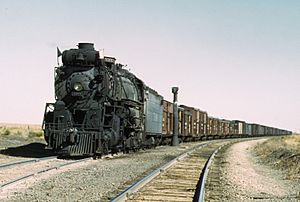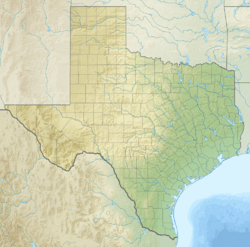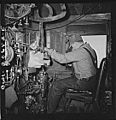Santa Fe 5000 facts for kids
Quick facts for kids Santa Fe 5000 |
|
 |
|
| Atchison, Topeka & Santa Fe Railway 2-10-4 steam locomotive No. 5000 "Madame Queen" waiting in a siding to meet an eastbound train in Ricardo, New Mexico, March 1943 | |
| Power type | Steam |
|---|---|
| Builder | Baldwin Locomotive Works |
| Serial number | 61524 |
| Build date | 1930 |
| Configuration | 2-10-4 |
| Gauge | 4 ft 8 1⁄2 in (1,435 mm) |
| Driver diameter | 69 in (1,800 mm) |
| Wheelbase | 24 ft 6 in (7.47 m) (driving wheelbase) |
| Boiler | 108 in (2,700 mm) diameter |
| Fire grate area | 121.7 sq ft (11.31 m2) |
| Cylinder size | 30 in (760 mm) diameter x 34 in (860 mm) stroke |
| Tractive effort | 95,584 lbf (425.18 kN) |
| Factor of adhesion | 3.89 |
| Retired | April 17, 1957 |
| Current owner | The City of Amarillo, Texas |
| Disposition | On static display in Amarillo, Texas |
|
Atchison, Topeka and Santa Fe Railway Company Depot and Locomotive No. 5000
|
|
| Location | 307 S. Grant, Amarillo, Texas |
| Area | 12 acres (4.9 ha) |
| Architect | E.A. Harrison |
| Architectural style | Mission/Spanish Revival, 5000 Series Steam Locomotive |
| NRHP reference No. | 86002189 |
| Added to NRHP | September 18, 1986 |
The Santa Fe 5000 is a huge steam train engine. It was built in 1930 by the Baldwin Locomotive Works for the Atchison, Topeka and Santa Fe Railway. This special engine was quickly called the "Madame Queen." It was the only one of its kind! Today, the Santa Fe 5000 is on display in Amarillo, Texas. It is cared for by the Railroad Artifact Preservation Society. This amazing locomotive is also listed on the National Register of Historic Places.
Contents
Building a Giant: The Santa Fe 5000
The Santa Fe 5000 was a "Texas" type steam locomotive. This means it had a special wheel setup. It had two small wheels at the front, ten large driving wheels in the middle, and four smaller wheels at the back.
The Santa Fe 5000 was the first engine of its kind for the railway. It helped the company decide how to build even more powerful trains later on.
Why the Santa Fe 5000 Was Built
In 1930, the Santa Fe Railway wanted stronger engines. They needed trains that could pull more weight faster. The Santa Fe 5000 was built to meet this need.
This new engine was tested between Clovis and Vaughn, New Mexico. The tests showed it was a big success! The Santa Fe 5000 could pull 15% more cargo. It did this in 9% less time. Plus, it used 17% less coal than older engines.
Even though it was a success, the Great Depression started. This was a tough time for the country. So, the railway decided not to spend a lot of money. Because of this, no more engines exactly like the 5000 were built for a while.
A New Era of Power
Later, in 1938, new "Texas" type engines were built. They had many improvements. The Santa Fe 5000 and these newer engines were the most powerful trains on the Santa Fe Railway. They were truly amazing machines!
Changes Over Time: Madame Queen's Upgrades
The Santa Fe 5000 did not change much during its working life. One big change was getting a larger, square-shaped fuel car, called a tender. This new tender meant the roof of the engine's cab had to be changed. This allowed crew members to walk from the cab to the top of the tender.
Another important change happened in 1940. The engine was changed from burning coal to using fuel oil. This made it more efficient to run.
Saving a Legend: The Santa Fe 5000 Today
On April 17, 1957, the Santa Fe 5000 stopped working. It had traveled over 1.75 million miles! The engine was then given to the city of Amarillo, Texas. It was put on display outside the Santa Fe station.
In 2005, a group called the Railroad Artifact Preservation Society moved the 5000. They moved it to a new spot in Amarillo. They plan to build a special home for the engine. This building will help protect it for many years to come. In 2016, there was talk about selling the locomotive, but it remains in Amarillo.
Images for kids
 | Valerie Thomas |
 | Frederick McKinley Jones |
 | George Edward Alcorn Jr. |
 | Thomas Mensah |








